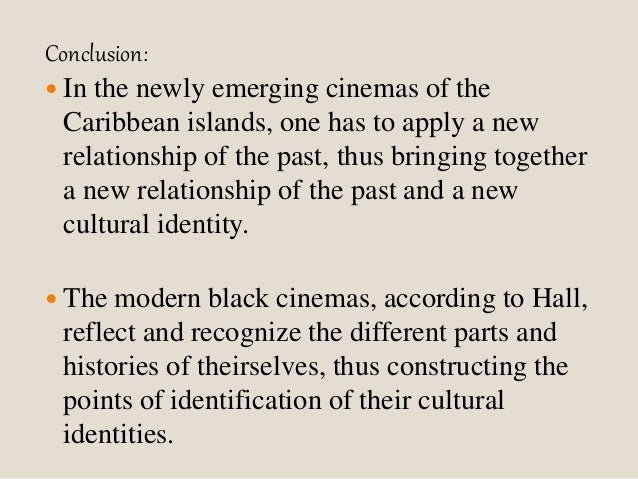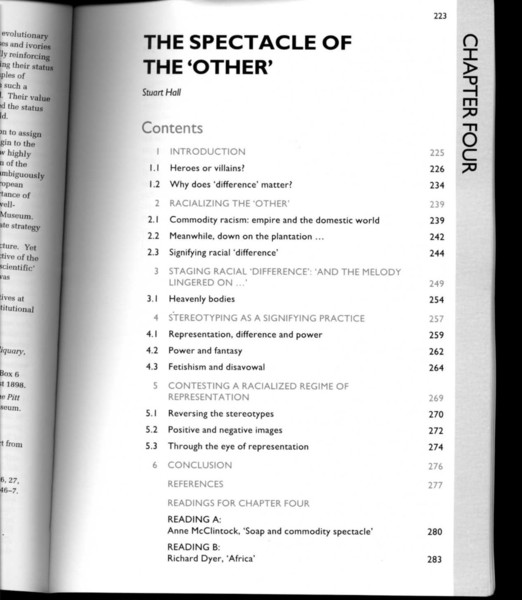Hall Spectacle Of The Other Pdf




Share their work. Hall saw something else: an opportunity to share his life. Link by link, he built a hypertext edifi ce of autobiography, a dense thicket of verbal self-exposure leavened with photos and art. In January 1996, on a dare, he began posting a daily blog, and readers fl ocked to the spectacle of a reckless young man. Semantic Scholar extracted view of 'THE SPECTACLE OF THE ' OTHER ' by S. The Work of Representation - Stuart Hall Representing the Social - Peter Hamilton France and Frenchness in Post-War Humanist Photography The Poetics and Politics of Exhibiting Other Cultures - Henrietta Lidchi The Spectacle of the 'Other' - Stuart Hall Exhibiting Masculinity - Sean Nixon Genre and Gender - Christine Gledhill The Case of Soap Opera.
Girl don’t be a girl -don’t be a girl don’t be a girl don’t be a girl -don’t be a girl don’t be a girl don’t be a girl don’t be a girl don’t be a. The Society of the Spectacle is a philosophical text presented in nine chapters and 221short theses. Each thesis is brief—about a paragraph in length. The text presents an extensive reinterpretation of the philosophy of Marx, with particular focus on commodity fetishism and contemporary mass media.
 Cite this Item
Cite this Item Copy Citation
Hall Spectacle Of The Other Pdf Of One
Export Citation
Monthly Plan
- Access everything in the JPASS collection
- Read the full-text of every article
- Download up to 10 article PDFs to save and keep
Yearly Plan
- Access everything in the JPASS collection
- Read the full-text of every article
- Download up to 120 article PDFs to save and keep
Hall Spectacle Of The Other Pdf I Love
The vigorous growth of Cultural Studies has in part come about through an insistence on strong contrasts with sociology. Unlike sociology, the theoretical orientations of Cultural Studies are often held to be postmodern and discursive in character. This paper questions the usefulness of such contrasts by examining the work of Stuart Hall, focusing in particular on the problem of hegemony. I argue that Hall's approach slides ambiguously between reading hegemony as either concentrated state domination or free-wheeling discourse. Consequently, Hall cannot resist and indeed in some ways reinforces the discursive turn in contemporary Cultural Studies, despite his own explicit criticisms of this development. I track the instability of Hall's approach to an abstract logic of articulation that fragments social relations and subordinates them to political association. Hall's predicament suggests that social life must be theorized as something more than a pliant diversity of sites. The problem of hegemony calls for an account of cultural and group formation as distinct from their political and ideological construction. I thus conclude that Cultural Studies stands in need of a sociological re-orientation.
For more than 50 years The British Journal of Sociology has represented the mainstream of sociological thinking and research. Consistently ranked highly by the ISI in Sociology, this prestigious international journal publishes sociological scholarship of the highest quality on all aspects of the discipline, by academics from all over the world. The British Journal of Sociology is distinguished by the commitment to excellence and scholarship one associates with its home at the London School of Economics and Political Science.http://www.interscience.wiley.com
Wiley is a global provider of content and content-enabled workflow solutions in areas of scientific, technical, medical, and scholarly research; professional development; and education. Our core businesses produce scientific, technical, medical, and scholarly journals, reference works, books, database services, and advertising; professional books, subscription products, certification and training services and online applications; and education content and services including integrated online teaching and learning resources for undergraduate and graduate students and lifelong learners. Founded in 1807, John Wiley & Sons, Inc. has been a valued source of information and understanding for more than 200 years, helping people around the world meet their needs and fulfill their aspirations. Wiley has published the works of more than 450 Nobel laureates in all categories: Literature, Economics, Physiology or Medicine, Physics, Chemistry, and Peace.Wiley has partnerships with many of the world’s leading societies and publishes over 1,500 peer-reviewed journals and 1,500+ new books annually in print and online, as well as databases, major reference works and laboratory protocols in STMS subjects. With a growing open access offering, Wiley is committed to the widest possible dissemination of and access to the content we publish and supports all sustainable models of access. Our online platform, Wiley Online Library (wileyonlinelibrary.com) is one of the world’s most extensive multidisciplinary collections of online resources, covering life, health, social and physical sciences, and humanities.
This item is part of JSTOR collection
For terms and use, please refer to our Terms and Conditions
The British Journal of Sociology © 1998 London School of Economics
Request Permissions